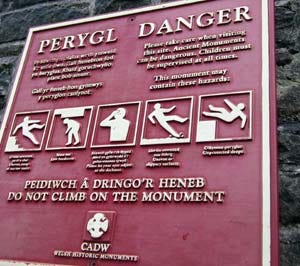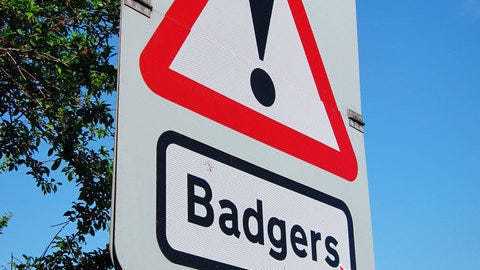How foreign street signs can make you an ugly tourist
Are you the ugly tourist on vacation or blithely ignorant?
If you live in a tourist region, as I do, or if you travel a lot, you’ve certainly witnessed tourists being stupid, if not outright acting badly. Some comments or actions are merely funny, while others rise to the rank of “ugly tourist.” Sometimes, foreign street signs help.
It goes from the Canadians who asked if they could return the books they just purchased at my daughter’s bookstore if they found them someplace else cheaper, to the out-of-stater who decided he wasn’t going to wait behind a car stopped at a crosswalk and almost ran over my grandson as the driver tried to pass on the inside. So, imagine our chagrin when my daughter, grandson (then 10), and I joined the ranks of the stupid tourists on a recent trip to Wales and its indecipherable foreign street signs.
Welsh signs can be the most difficult to decipher
On our drive over to Wales after arriving that morning in London, we were finding the Welsh road signs to be quite humorous (and sometimes even a little scary). One with a dramatic zig-zag line stated, “Oncoming vehicles in middle of road.” “Why!?!” we would ask. “Why aren’t they on their side of the road!”
Another sign was, “WEAK BRIDGE.” Did that mean it wasn’t safe to drive over it? That at any moment some unlucky driver would plunge to their death? The somber sign alerting us to elderly people (placed near “Care” homes) was a good reminder to drink your milk or take your calcium supplements, as it showed two bent-over figures, one with a cane.
And the signs when we entered a castle were sometimes a little hard to decipher, but they certainly illustrated all kinds of calamities that could befall you at every turn. But, we were baffled by the meaning of one sign, so that night at the Queen’s Head Inn in Monmouth, we asked the bartender, “So, what do the ‘Badgers’ signs mean?”
Watch out for badgers
This ugly tourist exchange still makes us cringe.
He looked at us as though we were quite odd and said, “Why, it means there are badgers.”
In our defense, the “Badgers” signs were triangular signs with a big exclamation point in the middle and only had the word Badgers (and the Welsh translation) on a smaller sign below it. We assumed this was some sort of cryptic message — they must have meant something that we foreigners just couldn’t comprehend.
The signs didn’t show a badger! Back in the US, deer crossing signs show a leaping deer. Or, there’s the giant moose head on the “Brake for Moose, It Can Save Your Life” signs in northern New England.
While I’m sure they are in place to protect the animals, as well, our warning signs appear more to protect the drivers. After all, we don’t have porcupine or turtle crossing signs.
A little searching on Google that night in our room and we soon discovered that the Welsh (and all of the U.K.) were really concerned about their badgers.
We were mortified that we had asked such a stupid question – there are even online badger-tracking clubs. Who knew!
ALSO ON TRAVELERS UNITED: Everything you need to know about traveling with animals (and kids)
Well, that little incident shows that I have not always been the sophisticated tourist. But, between the relatively harmless incidents of finding the signs on highways and tourist attractions funny, if sometimes confusing, to actually being caught joking about local manners and encountering language problems, some might even classify me as an “ugly tourist,” heaven forbid.
Speaking louder does not make you more understandable
In the novel, a Burmese journalist says “For some reason, the [American] people I meet in my country are not the same as the ones I knew in the United States. A mysterious change seems to come over Americans when they go to a foreign land. They isolate themselves socially. They live pretentiously. They are loud and ostentatious.” (The Ugly American by Eugene Burdick and William Lederer)
Yes, I’ve been loud and ostentatious at times. My youngest daughter remembers slinking out of a clothing store so as not to be associated with me in Paris as I tried to make myself understood to the non-English-speaking clerk. If you enunciate in English slowly enough and speak loudly enough, French store clerks will understand you, right? Wrong.
Then there’s the ugly-tourist incident after a delicious meal with lots of Canadian beer in Quebec City, when my friends and I thought we were hilarious speaking to each other in English with exaggerated French accents. Luckily, one reasonable person in our group suggested we might be offending the Québécois near us.
READ ALSO: Getting the best and most useful clothing for travel
Adding an “o” to every word does not make it Italian
Another cringe-worthy ugly tourist episode occurred in Venice as a friend’s husband thought he was a riot “speaking” Italian just by adding an “o” onto the end of every English word. His daughter was ready to push him out of the gondola!
My best friend told me of traveling with another couple in Spain where the husband complained loudly about the food (yes, in Spain!) because he couldn’t find a decent American-style hamburger.
Ugly tourist transgressions are not seen as sophisticated
While none of these ugly tourist transgressions are going to bring about an international incident, they didn’t exactly make us appear like the smartest or the most sophisticated travelers out there (or even all that polite). And, if we were the only Americans they met, what opinion of us were we leaving them?
Since the badger incident, I now make a special effort to be a little more tolerant of those who are visiting my home area and I try to read up, or at least ask intelligent questions, on places I’m visiting. My grandson, now 18, would say I haven’t quite mastered that yet. Of course, he is now a tourist in Wyoming.
All photos © Karen Cummings
Karen Cummings
After several decades working in a variety of jobs as a newspaper writer, event publicist, communications specialist, and marketing director, Karen Cummings is now “retired” and working on Travelers United’s social media and newsletters in addition to occasionally contributing a travel-related article to TU’s blog. She lives close to her family in Fryeburg, Maine, and travels as often as she can.











You must also be careful using hand signals abroad. What means good luck in one country (Brazil) is a sign of great disrespect in another (Italy)